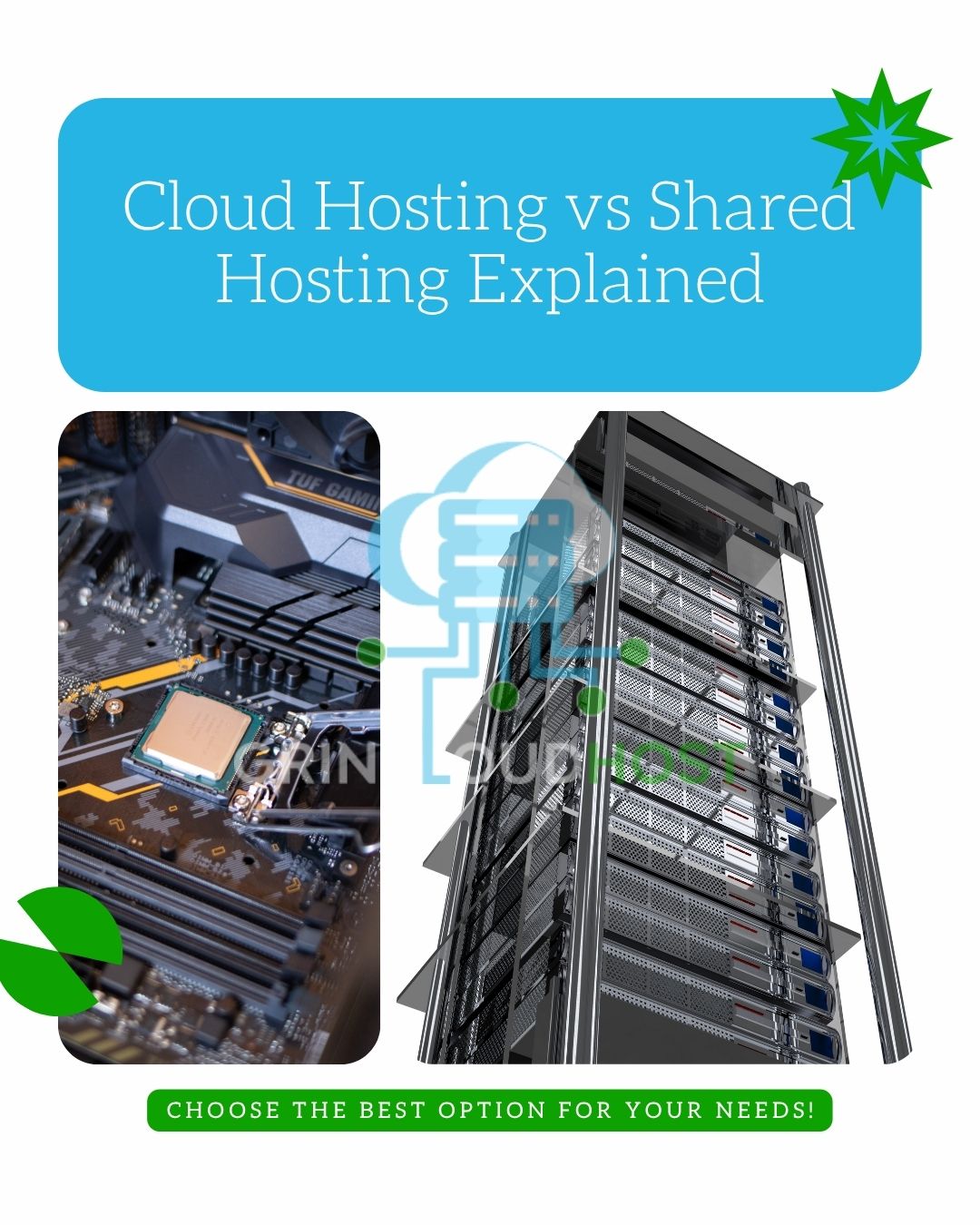
When launching a website, one of the first big decisions you’ll face is choosing the right type of hosting. With so many options available, it can be tough to decide between cloud hosting vs shared hosting. Both have their pros and cons—and the best choice depends on your goals, budget, and technical needs.

In this blog, we’ll break down the differences, pros, cons, costs, and use cases to help you make an informed decision.
What is Shared Hosting?
Shared hosting is a type of web hosting where multiple websites are hosted on a single server. It’s like renting a room in a shared apartment—you get the basics, but you’re sharing resources (like CPU, memory, and bandwidth) with others.
✅ Pros of Shared Hosting:
- Affordable – Great for beginners and small websites.
- Easy to manage – Hosting providers handle maintenance and setup.
- Ideal for low-traffic sites like blogs, portfolios, or personal projects.
❌ Cons of Shared Hosting:
- Slower performance – Your site can slow down if other sites on the server use too many resources.
- Limited customization – You don’t get full control over server settings.
- Security risks – One compromised site can potentially affect others.
What is Cloud Hosting?
Cloud hosting uses multiple virtual servers to host your site. Instead of relying on one physical server, your website draws resources from a network—aka “the cloud.”
This makes it highly scalable, flexible, and resilient.
✅ Pros of Cloud Hosting:
- High performance and speed – Better resource distribution.
- Scalable – Easily upgrade your resources as your site grows.
- Reliable – If one server fails, another takes over.
- Secure – Isolated environments reduce risks.
❌ Cons of Cloud Hosting:
- Higher cost – More expensive than shared hosting, depending on usage.
- Slightly more technical – May require some hosting knowledge.
Cloud Hosting vs Shared Hosting: Key Differences
| Feature | Shared Hosting | Cloud Hosting |
|---|---|---|
| Performance | Basic, affected by other users | High, consistent |
| Scalability | Limited | Highly scalable |
| Cost | Low | Pay-as-you-go or based on usage |
| Security | Shared environment | Isolated, more secure |
| Reliability | Single server (single point of failure) | Multi-server, highly available |
| Customization | Limited | Moderate to high, depending on provider |
Cost Comparison: Cloud Hosting vs Shared Hosting
One of the most searched topics—especially on forums like Reddit—is “cloud hosting vs shared hosting cost”. Here’s a basic idea:
- Shared Hosting Plans start as low as $2–$5/month.
- Cloud Hosting Plans usually start at $10–$20/month but offer better scalability and performance.
While shared hosting wins on price, cloud hosting offers better value for growing or high-traffic websites.
What About VPS and Dedicated Hosting?
If you’re also exploring other options like:
- VPS Hosting – A middle-ground option offering more control than shared but less scalability than cloud.
- Dedicated Hosting – You rent an entire server, which is powerful but expensive and harder to manage.
Then, cloud hosting offers a flexible and cost-effective balance between the two, making it ideal for businesses and modern applications.
When to Choose Shared Hosting
- You’re just starting out.
- You’re running a personal blog or portfolio site.
- Budget is a top priority.
When to Choose Cloud Hosting
- Your website is growing or expects spikes in traffic.
- You need reliability, scalability, and speed.
- You’re running an online store, SaaS, or business website.
Final Thoughts: Which Hosting is Right for You?
Both shared and cloud hosting serve different needs. If you’re looking for a budget-friendly, beginner-friendly solution, shared hosting is a great start.
But if you need scalability, speed, and performance, especially for business or eCommerce, cloud hosting is the smarter long-term investment.
🚀 Ready to Upgrade?

At GrinCloudHost, we offer flexible and affordable cloud hosting plans tailored to your needs.
Whether you’re moving from shared hosting or starting fresh—our team is here to help you scale with confidence.


